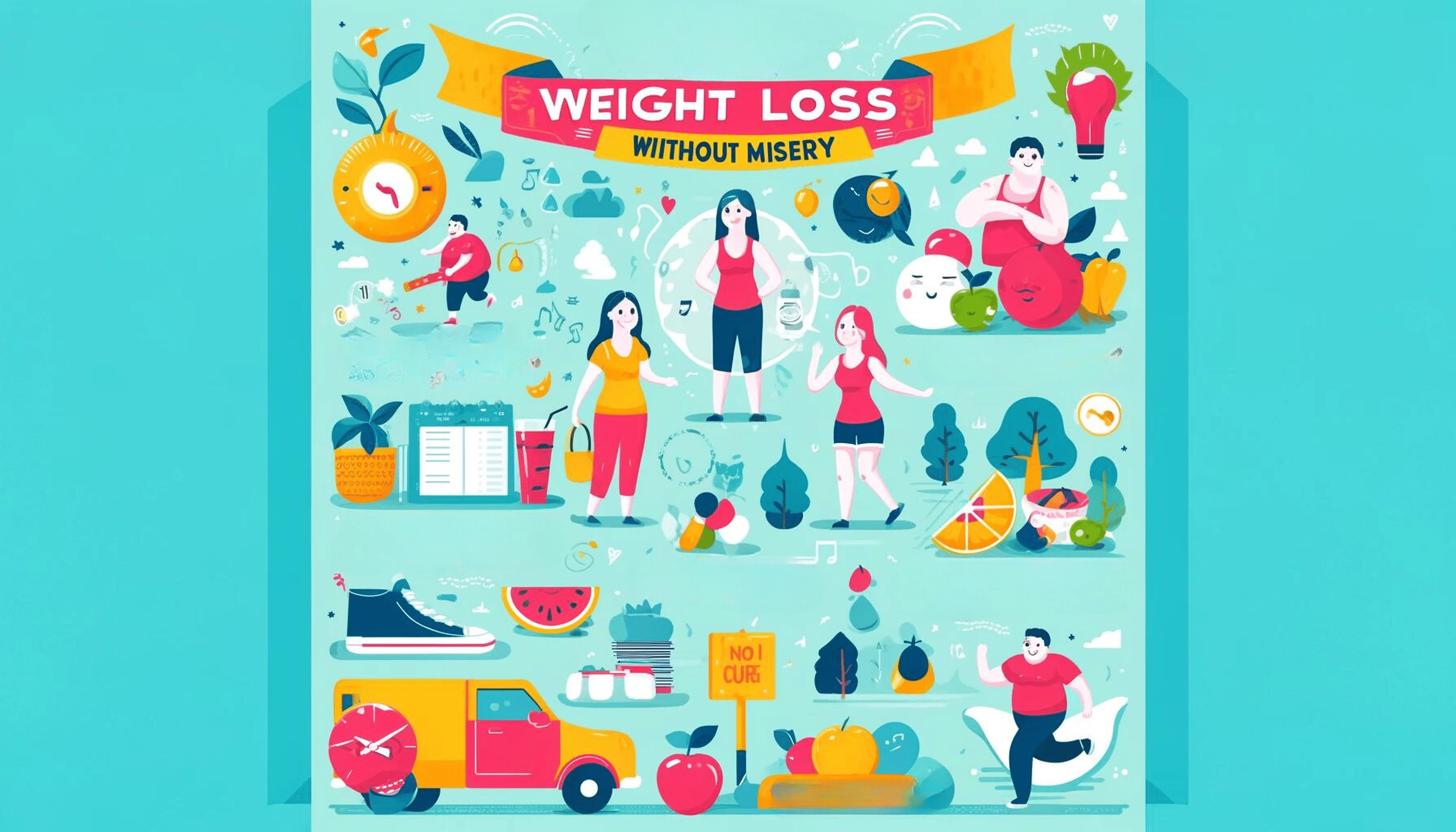How do I Lose Weight without Feeling Miserable?

Setting Realistic and Enjoyable Goals
When it comes to weight loss, one of the most crucial steps is to set realistic and enjoyable goals. This is imperative for a couple of reasons. Firstly, setting attainable goals keeps you motivated and improves your chances of success. Secondly, making these goals enjoyable aids in sustaining the weight loss over time as it doesn't feel like a chore or an insurmountable task.
Understanding the Importance of Realistic Expectations
A common pitfall in the weight loss journey is setting goals that are too steep or beyond one's reach. For instance, a plan to lose 15 pounds in a month is not only unrealistic but can also pave the way for unhealthy practices. Understand that the recommended healthy weight loss rate is typically 1-2 pounds per week. It's crucial to align your weight loss goals with this guideline to avoid detrimental health effects in the long term. Having realistic expectations can resist feelings of frustration and keep you committed to your weight loss journey without making you miserable.
Incorporating Enjoyable Activities into Your Weight Loss Plan
Another key aspect of setting achievable and enjoyable goals is incorporating activities that you genuinely enjoy. Whether it's a Zumba class, a peaceful cycle around the park, or an advanced yoga session, ensure that the activities in your plan are ones that you look forward to. This not only makes the process enjoyable but also improves adherence to the exercise regimen. Avoid turning your exercise routine into a punishment. Instead, see it as a bespoke opportunity to improve your health, fitness, and overall well-being.
Avoiding Extreme Diets and Embracing Balance
Balance rather than restriction is the key to sustainable weight loss. Extreme diets that eliminate whole food groups, gravely cut down on calories, or require you to eat only certain foods at all times can make you feel deprived, leading to a negative relationship with food. These diets are not only unsustainable but also can lead to nutrient deficiencies and other health issues over time. Whereas, a balanced diet with a good variety of nutrients not only supports weight loss but also promotes overall health. Remember, healthy eating is not about total restriction; it's about creating healthy habits that you can maintain in the long term.
In conclusion, setting realistic and enjoyable goals is an effective way to pursue weight loss without feeling miserable. By understanding the importance of realistic expectations, incorporating enjoyable activities into your weight loss plan, and avoiding extreme diets while embracing balance, you can achieve and sustain your weight loss goals. Remember, your journey is unique, listen to your body, and do what's best for you.
Ultimately, the journey to effective weight loss is as much about mental well-being as it is about physical transformation. Therapy, mindfulness, and AI-guided mental health support apps can also play a critical role in bolstering your mental health during this transformative journey. Always think long term, and remember, the idea is to adopt a lifestyle that promotes health and happiness.
Finding Joy in the Journey: Diet and Exercise
Embarking on a weight loss journey doesn't solely focus on losing pounds, it's about forging a new, healthier path in life. This gives ample opportunities to learn, grow, and find joy in both diet and exercise facets of this journey. This section will present you with advice on how to find fulfillment in this journey, concentrating on three main aspects: discovering physical activities you love, exploring delicious yet nutritious food, and focusing on non-scale victories.
Discovering Physical Activities You Love
Exercise is a fundamental pillar in successful weight loss, but it doesn't need to be monotonous nor punishing. It's essential to find physical activities that you genuinely enjoy, turning them into habits, and even finding a newfound passion. This could be anything, from dancing, hiking, yoga, gardening to other kinds of active pastimes. It's about finding what works best for you.
Experiment with different forms of exercises until you find a form that you love and look forward to. This transforms exercise from a chore into a hobby, allowing for a more sustainable approach. Joining classes or groups can introduce an element of community and camaraderie, making the process less daunting and more enjoyable.
Exploring New, Healthy Recipes That Excite You
One common misconception on a weight loss journey is believing that you must resign to a life of bland, unexciting food. However, this is far from the truth. Nutritious food can be vibrant, flavorful, and incredibly satisfying. Exposing yourself to a variety of ingredients and cooking techniques can transform your perception of 'diet food. Seek out healthy recipes that excite your palate and bring joy back into eating.
Invest in a few good quality cooking resources, preferably those focusing on wellness and nutrition. These resources often have innovative methods to make vegetables, grains, proteins, and fruits the star of the dish, without excessive calories. Also, include family or friends in the cooking process to make it more of a social and fun experience.
Focusing on Non-Scale Victories
Finally, while the number on the scale may be a dominant metric in your weight loss journey, it's far from being the only one. It's equally important to recognize and celebrate the non-scale victories along the way. This could be fitting into an old pair of jeans, noticing an improvement in your energy levels, reduced cravings, climbing few flights of stairs without running out of breath, or even a positive change in your mood and overall well-being.
These victories allow you to appreciate the comprehensive health benefits that come with weight loss, helping you to remain motivated even if the scale isn't rapidly dropping. Remember, weight loss is a journey, not a race. The objective is to establish lasting lifestyle habits, not merely attaining a specific weight.
Remember, each person's journey is unique, celebrate the victories, no matter how small they seem, and continually strive to find joy in both the diet and exercise aspects of it. Optimizing your lifestyle practices towards your wellbeing is the ultimate victory.
Maintaining Motivation and Managing Setbacks
When embarking on any weight loss journey, the importance of maintaining motivation and managing setbacks effectively cannot be overstated. This involves understanding the role that setbacks play in your journey, fostering self-compassion, and leveraging support to encourage progress.
Practicing Self-Compassion and Kindness
The process of losing weight can be challenging both physically and emotionally. Developing a sense of self-compassion becomes paramount to maintain motivation. Self-compassion is the ability to treat yourself with the same kindness and understanding you would show to a friend. It involves acknowledging the struggle without criticizing yourself. Whenever negative thoughts about your progress enter your mind, try to replace them with kinder, more positive affirmations. This practice can change your mindset and make the process more enjoyable. It's also beneficial to remember that weight loss isn't a race, it's a journey. You're working on building sustainable habits, and that takes time.
Leveraging Support from Friends, Family, or Groups
Building a supportive community around you can be a valuable tool for maintaining motivation. The support and motivation you might receive from friends, family, or weight loss groups can make a huge difference and can provide you with a sense of belonging and shared goals. They can also provide accountability and helpful advice, as well as encouragement during times when you might be tempted to give up. It's essential, though, to make sure this is a supportive environment that fosters positivity and understanding.
Viewing Setbacks as Opportunities for Growth
Every journey has setbacks, they are an inevitable part of life. But when it comes to weight loss setbacks, the key is not to succumb to feelings of failure. Instead, these moments should be used as learning opportunities. If a strategy isn't working, that's useful information to help you adjust your plan. Furthermore, setbacks often strengthen resolve and can help you develop determination and resilience. Consequently, don't be discouraged by a few missteps, instead understand that they can provide you with valuable insights and experience that will make your journey more fruitful.
Always remember, weight loss is not just about changing your eating and exercise habits, but also your mindset. By understanding this, you can approach your journey with a broader perspective that makes it less about deprivation and more about growth and self-improvement.
In Summary
To wrap up, setting realistic and enjoyable goals is an integral part of weight loss journeys. Essential factors such as maintaining realistic expectations, incorporating enjoyability into workouts, and prioritizing balance over restriction in your diet, can significantly improve your journey's outcome. Additionally, discovering physical activities you genuinely love, experimenting with flavorful and nutritious recipes, and acknowledging non-scale victories along the way are excellent strategies towards enhancing your health and well-being journey. Last but not least, exercising self-compassion, seeking support, and viewing setbacks as learning opportunities play a crucial role in sustaining motivation and managing challenges.
In terms of actionable steps:
- Start by reviewing and redefining your weight loss goals. Are they realistic and enjoyable? Remember, the maximum recommended weight loss rate is 1-2 lbs per week.
- Identify physical activities you enjoy doing and incorporate these into your weekly routine. Make sure you are looking forward to it rather than dreading it.
- Develop a balanced diet plan, avoiding extreme diets. Look for exciting and healthy recipes that align with this approach to avoiding feeling deprived.
- Track non-scale victories, such as improvements in energy levels, or fitting into older clothes. These victories will keep you inspired.
- Cultivate self-compassion. Treat yourself kindly when you face setbacks.
- Leverage a supportive community. This could be a group of friends, family members, or dedicated weight loss communities online or offline. This will help you stay accountable and encourage you during challenging times.
- Each time you face a setback, assess and learn from it. See it as an opportunity to adjust your strategy and grow.
Remember, the weight loss journey is not only about losing weight but about adopting a healthier lifestyle and improving your overall well-being in a sustainable manner. Take one step at a time, follow the action steps, and make progress at your own pace.





